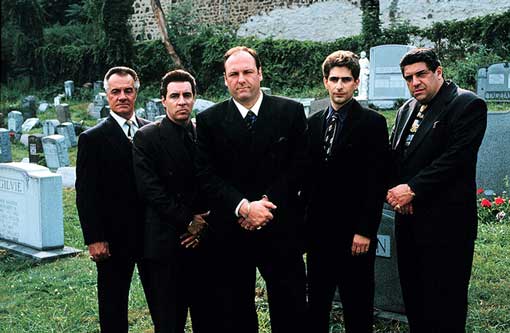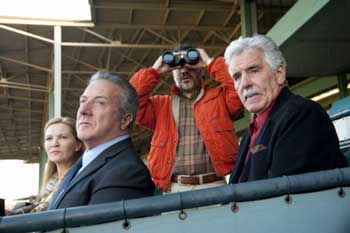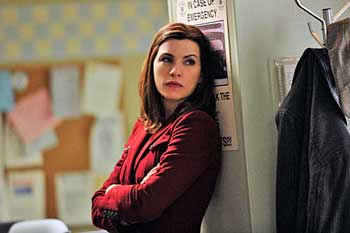
At least once a month, my wife and I order a DVD from Netflix that contains a quartet of
Law & Orderepisodes, usually a disc from a mid-'90s season when the great minimalist Steven Hill was still playing the district attorney and both Sam Waterston's and Jerry Orbach's shtick were fresh.
We feel a need for something with which we can kill an hour here, an hour there, and not have to worry about: a) having our intelligence insulted, and b) committing ourselves to 12 hours of keeping track of yet another running storyline. Prime time dramas of that ilk are an endangered species.
I started thinking about this after reading a piece Ryan McGee recently wrote for the AVClub website. McGee created a bit of a stir in the blogosphere by contending that HBO, starting with The Sopranos, has done television more harm than good and has perhaps even "ruined" the medium. Which of course flies in the face of the conventional critical wisdom that we are in the midst of television's new "golden age of drama" thanks to HBO and the three Davids: Chase (Sopranos), Simon (The Wire) and Milch (Deadwood).

My initial reaction was that McGee was full of scungilli. But upon further reflection, I think he does have a point.
"HBO doesn't air episodes of television [anymore], it airs installments," McGee wrote. "An episode functions unto itself as a piece of entertainment, one that has an ebb and flow that can be enjoyed on its own terms. An installment serves the über-story of that season without regard for accomplishing anything substantial during its running time." He then argued that Luck [photo at right], HBO's latest adventure in installment-oriented, novelistic television, took an unconscionable three and a half hours to get up to a trot. He found the Milch series' failings all too typical of overreaching serials that have become commonplace since The Soproanos "turned into the boilerplate for what passes as critically relevant television."
If Luck took too long to dig its hooves in, that doesn't make novelized television a bad idea; it's just bad novelizing. Whether you're talking Jane Austen or Jacqueline Susann, Alan Ball or Aaron Spelling, if you produce long passages of fiction in which nothing substantial happens, you're not doing your job very well.
What bothers me more about the spreading popularity of HBO's Sopranos template is not that many of the shows it begat aren't as good. Sturgeon's "law" says that 90 percent of everything is crap, and television is not now and never has been immune to it. No, it's that pretty much all the networks, even the broadcast networks, have largely stopped commissioning and scheduling dramas that consist of stand-alone episodes. Well, okay, stand-alones that don't rely heavily on exploding cars or an endless parade of serial killers who make Jeffrey Dahmer look like Matt Lauer.
The self-contained or stand-alone episode has a distinguished history, not just in television but in literature. Sir Arthur Conan Doyle's Sherlock Holmes stories -- forerunner of the episodic procedural drama -- are as enthusiastically read today as the Charles Dickens novels that originally appeared in newspapers on the installment plan. Television over several decades used that model in dozens of engaging crime-solver variations, from Peter Gunn to The Rockford Files. I'd love to see the networks, cable and broadcast, embrace it again.

Even the series that most cleverly resolve a weekly plot while servicing novelistic character threads -- an elite group in which I would place CBS's The Good Wife [photo at right] and FX's Justified -- don't satisfy random (or rerun) viewing as well as series that wrap up neatly (or not so neatly), as Law & Order did. The networks may be limiting their own audience potential by buying so many dramas that require long-term viewing investment. I am utterly captivated by NBC's new musical serial Smash, but there's only so many of these shows I can watch live or stream later. I decided to abandon ABC's The River after one episode. Why bother working so hard to get into a (somewhat muddled) storyline if you know you'll get steadily more lost if you don't see every installment? NBC’s Awake, which premiered last Thursday after a run of intriguing, ubiquitous promos, already has me questioning whether I have the time for it.
There's nothing wrong with TV attempting serious long-form fiction. The medium is uniquely equipped for it. And I'm glad to have Mad Men and Breaking Bad. But sometimes all I want is a good short story.